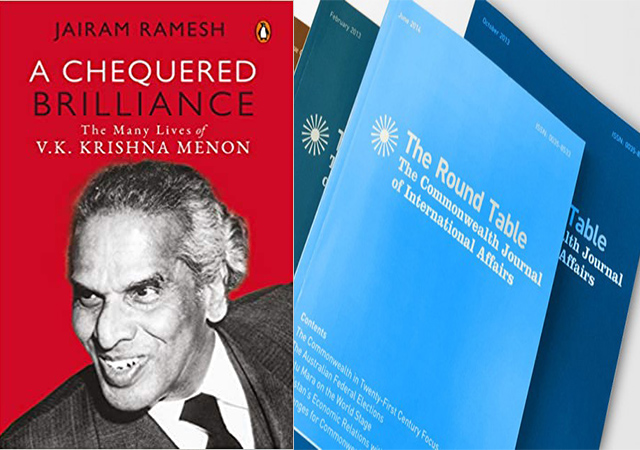
[This is an excerpt from a book review appearing in The Round Table: The Commonwealth Journal of International Affairs.]
‘Consequential and controversial’ is how the blurb to this book describes its subject – the Indian politician, V.K. Krishna Menon, who made as much a mark in the UK as he did in the country of his birth. Menon assumed many roles in the course of a long and chequered career: crusader for Indian independence, Labour councillor in the London borough of St Pancras, the inspiration behind Pelican books, close friend and political associate of Jawaharlal Nehru, lawyer, non-career diplomat, and combative cabinet minister. To write about this complex figure with any authority and credibility required a scribe of consummate judgement and acuity – qualities which Jairam Ramesh, a member of India’s parliament, journalist and author of a number of books, possesses in ample measure (it is to Ramesh’s credit that his affiliation to the Congress Party, of which Menon was a stalwart, has not impaired his objectivity in undertaking the present task).
The book, he explains in a prefatory note, is almost entirely the product of documentary research:
I narrate a complex tale letting the written materials speak for themselves. Krishna Menon is an eminently fit subject for what has been called ‘psychohistory’. I have refrained from tilling that field and have stuck mostly to what the archives tell us … As far as possible, I have kept myself out of the story. Krishna Menon’s proponents have spun many legends, just as his detractors have propagated many myths. Neither approach does full justice to the man and his mix of contradictions and brilliance. My task has been to pierce through the legends and the myths, the embellishments and the exaggerations and present the man as he was – erratic, insecure, frequently acerbic in speech, very often supercilious in silence; but always arresting and compelling. He could never be ignored and always stood out, warts and all (p. xvi).
The research is impressive, indeed exceptional by contemporary Indian standards. Given the broad sweep of time that the work covers, its comprehensiveness, combined with an attention to detail, makes it one of the best biographies to come out in recent years. As an aside, it is worth mentioning that anyone fearing the usual shortcomings of Indian publishing, such as flaccid editing or the absence of a back index, will be pleasantly surprised and hugely relieved to see that they are non-existent.
A door-stopper of a volume, the book is divided into seven parts arranged chronologically and sub-divided into two broad epochs, pre- and post-1947, the year of India’s independence. Sources are cited but with discretion and restraint so that the reader is not lost in a forest of references. There is a manageable and well-organised bibliography to which the more academically-minded reader can turn for further guidance. Discerning readers will not fail to notice that the acknowledgements section is, at less than two pages, a model of brevity – it, refreshingly, eschews an emerging trend on the part of many authors to use that section to show off the range and breadth of their contacts and acquaintances.
Capturing the complexity of Menon’s life and career must arguably be the single biggest challenge for anyone attempting to write his life story; it is to Ramesh’s credit that he has pulled off a remarkable feat in meeting that challenge. An essential fairness characterises his assessment of Menon’s strengths and weaknesses, which will strike even the uninitiated reader as worthy of credit. The assessment spans not only Menon’s domestic political career but also his contributions, on the international plane, to the armistice in Korea (1953), the political settlement on Vietnam, Cambodia and Laos (1954), the Suez crisis negotiations (1956), the campaign against apartheid in South Africa (1953–62), and the crisis in Congo (1961), not to mention his brief but not insignificant stint as a barrister in both England and India, which included being part of the defence team for Udham Singh, the young man who had shot dead Sir Michael O’Dwyer, the governor of Punjab at the time of the 1919 Jallianwala Bagh massacre (‘He muscled his way to be the junior counsel to St John Hutchinson … conscious of its publicity value,’ notes Ramesh about Menon with a candour which many will find admirable). The book does full justice to the various epithets that have been hurled at Menon: ‘Rasputin, Mephistopheles, Lucifer, Svengali, Evil Genius, The World’s Most Hated Diplomat, Sombre Porcupine, The Formula Man’ (p. xiii) – a motley collection, indeed, as Ramesh helpfully reminds us.
Historians and close observers of Indian politics will, understandably, want to know what new light, if any, the book throws on Menon’s fabled relationship with India’s first prime minister, Jawaharlal Nehru, and Ramesh does not disappoint. He offers an embarrassment of riches on the subject, quoting from correspondence which, it might be safe to surmise, has not been brought together in a single compendium before.
A chequered brilliance: the many lives of V.K. Krishna Menon by Jairam Ramesh, Gurgaon (India), Penguin, 2019.



